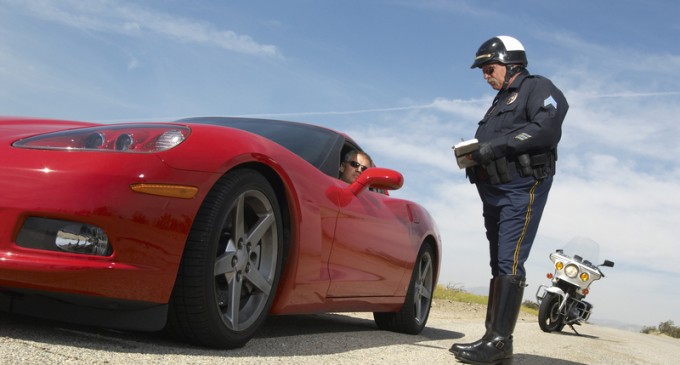
When the Supreme Court lost its most conservative member earlier this year, many thought that the remaining term could be a disaster for personal liberty cases. It turns out they were right. In the most recent decision, however, it’s not the court’s liberal wing who’s to blame. This time, the court’s traditionally conservative members dealt a confusing blow to the constitution’s Fourth Amendment.
Justices Thomas, Alito, Breyer, Kennedy, and Roberts joined forces in a decision that would grant the government additional search and seizure authority without probable cause. The decision likely intends to empower the police to stop and punish crime, but without prior knowledge of a crime being committed, all it does is allow a private citizen to be subject to imprisonment at the whim of U.S. authorities.
See what power this decision gives the U.S. government on the next page:

I wonder how many police have to get their face blasted off before that BS dies!
Liberals are so willing to give up rights
SCOTUS did it with the homos too, overturned there own decision which they can’t just do either.
Just keep watching. More to come. U.S. Customs has had this right around ports. Let’s see if our Muslim friends are subjected to this new decision.
But the Chief Justice says, ‘There must be an ultimate arbiter somewhere.’ True, there must; but does that prove it is either party? The ultimate arbiter is the people of the Union, assembled by their deputies in convention, at the call of Congress or of two-thirds of the States. Let them decide to which they mean to give an authority claimed by two of their organs. And it has been the peculiar wisdom and felicity of our Constitution, to have provided this peaceable appeal, where that of other nations is at once to force.” — Thomas Jefferson to William Johnson, 1823.
•
But the Chief Justice says, ‘There must be an ultimate arbiter somewhere.’ True, there must; but does that prove it is either party? The ultimate arbiter is the people of the Union, assembled by their deputies in convention, at the call of Congress or of two-thirds of the States. Let them decide to which they mean to give an authority claimed by two of their organs. And it has been the peculiar wisdom and felicity of our Constitution, to have provided this peaceable appeal, where that of other nations is at once to force.” — Thomas Jefferson to William Johnson, 1823.
•
•”To consider the judges as the ultimate arbiters of all constitutional questions [is] a very dangerous doctrine indeed, and one which would place us under the despotism of an oligarchy. Our judges are as honest as other men and not more so. They have with others the same passions for party, for power, and the privilege of their corps. Their maxim is boni judicis est ampliare jurisdictionem [good justice is broad jurisdiction], and their power the more dangerous as they are in office for life and not responsible, as the other functionaries are, to the elective control. The Constitution has erected no such single tribunal, knowing that to whatever hands confided, with the corruptions of time and party, its members would become despots. It has more wisely made all the departments co-equal and co-sovereign within themselves.” –Thomas Jefferson to William C. Jarvis, 1820.
Not wise!
Sandcoons in the supreme
so wrong